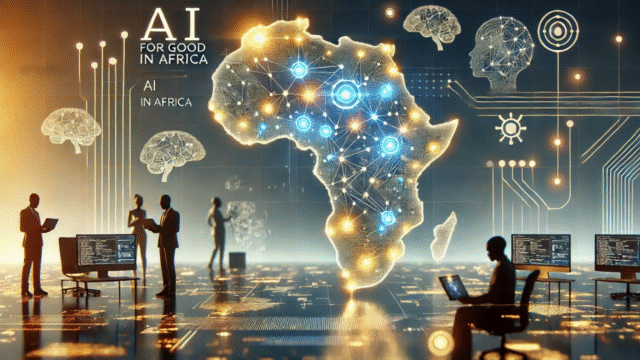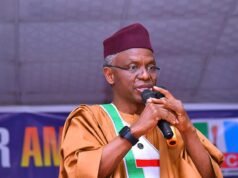Not long ago, the term Artificial Intelligence felt like something that belonged in Silicon Valley or science fiction—abstract, expensive, and a world away from Africa’s pressing realities. But in 2025, that perception is dissolving fast. Today, across the continent, Artificial Intelligence is quietly revolutionising everyday life, often in ways that feel deeply human: helping a farmer predict the next rainfall, diagnosing illness in a rural clinic, translating endangered languages, or enabling a street vendor to manage her stock through voice commands.
What’s striking isn’t just the technology itself, but how it’s being adapted by and for Africans. From Nairobi to Lagos, Kigali to Accra, AI isn’t just catching on—it’s being reimagined to reflect the continent’s diversity, innovation, and resilience. Governments are crafting national AI strategies, startups are thriving in local dialects, and homegrown talent is taking centre stage in the global AI conversation.
In this article, we explore 10 powerful ways Artificial Intelligence is changing Africa in 2025—not in some distant, theoretical future, but right now. From agriculture and healthcare to finance, governance, and the environment, these transformations aren’t just impressive—they’re necessary, and they’re happening faster than many anticipated.
Table of Contents
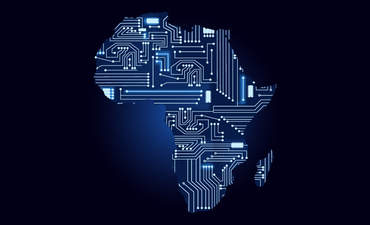
1. Agriculture for resilience and yield – the AI‑powered smallholder revolution
In 2025, Artificial Intelligence is rewriting the story of farming across Africa. Smallholder farmers now access weather forecasts and agronomic guidance through AI‑powered tools. Inspired by successful pilots in India, these systems—soon to roll out to millions across Africa—offer climate resilience and strengthen food security. These tools are reducing farmers’ debts while boosting savings by up to 10 % of annual income.
In Kenya, platforms like Virtual Agronomist and PlantVillage helped coffee farms triple yields—from 2.3 to 7.3 tonnes per hectare—demonstrating precision farming’s potential powered by AI.
2. Health care meets precision – AI diagnostics and tele‑medicine
Healthcare systems are now transforming thanks to Artificial Intelligence. In Rwanda, AI‑based chest X‑ray analysis is being deployed in rural clinics to detect diseases like TB and pneumonia with 92 % accuracy, dramatically improving triage and freeing up scarce medical staff.
In Ghana, language‑aware chatbots proficient in Twi, Ga, and Ewe handle patient intake, appointment scheduling, reminders, and basic assessments, even on simple phones. This innovation is expanding access in remote areas with limited healthcare infrastructure.
Public health surveillance is also being enhanced: AI algorithms are improving disease outbreak prediction, resource allocation and targeted interventions across the continent.
3. Finance and inclusion: AI‑backed credit scoring and fraud detection
AI plays a growing role in African financial inclusion. In Nigeria and Tanzania, lending platforms now use mobile‑SMS history, airtime behaviour and GPS usage patterns to assign credit scores to previously unbanked individuals. That’s unlocking microloans for millions without traditional documents.
Banks across the continent report fraud losses falling by more than 30 % following the adoption of AI‑based real‑time monitoring and transaction analysis systems, helping institutions keep money safer and customers more confident.
Estimates show AI and automation can save Africa’s financial sector tens of billions per year by reducing inefficiencies and fraud risk.
4. Preserving culture and supporting education through AI literacy tools
Artificial Intelligence is extending well beyond business. AI‑powered platforms are actively preserving endangered languages—such as Wolof, Kikongo, Luo, Venda—and reviving ancient texts, including elements of the Vesuvius and Ein Gedi scrolls.
In schools, AI‑driven tutoring systems now deliver personalised learning via SMS in rural Kenya. Students receive lesson‑tailored feedback in local dialects, helping bridge longstanding educational gaps.
5. Environmental stewardship: AI for floods, deforestation and land restoration
From flood alerts to wildlife protection, Artificial Intelligence helps conserve Africa’s environment. Google’s Flood Hub App now delivers advanced warnings across more than twenty countries, supporting early disaster preparedness. Meanwhile, Kenyan startup M‑Situ used AI to detect illegal logging and wildfires, cutting deforestation by nearly half in pilot zones.
Regreening Africa leverages AI‑based recommendations to restore degraded lands—boosting yields and recovering over 250,000 hectares to date.
6. Smart governance and policy planning: AI guiding public decisions
AI is now embedded in governance tools used by national governments. From optimising disaster response and traffic control to public policy forecasting—particularly in countries like Kenya, Uganda, and Ethiopia—AI helps leaders make smarter decisions.
The African Union’s Continental AI Strategy, endorsed in June 2024, provides a unified roadmap for member states to harness AI ethically, equitably and in ways tailored to African realities.
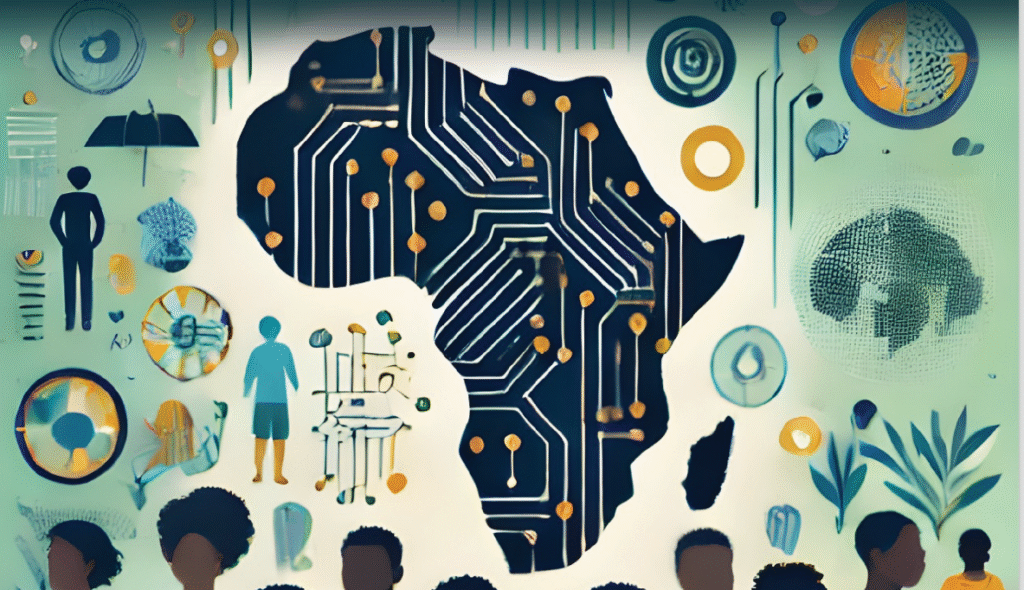
7. Homegrown innovation hubs: African talent fueling AI growth
Local innovation is booming. Kenya’s Adanian Labs runs a continental AI Centre of Excellence, training data scientists and incubating solutions tailored to local needs, such as drought forecasting and disease surveillance.
In Nigeria, Elite Global AI has trained over 30,000 young professionals in AI skills, aiming to reach one million by 2030 through partnerships and internships with global firms.
Funds and scholarship programs—like Bloomwit’s AI‑business writing initiatives—complement this growth by nurturing future African tech leadership.
8. Tech infrastructure and strategic investment: building Africa’s AI backbone
To power the AI boom, investments in infrastructure are finally materialising. In early 2025, Microsoft announced it would inject roughly 5.4 billion rand (~$300 million) into AI data centres in South Africa, while funding technical certifications for 50,000 individuals to build digital skills.
The African Development Bank and UN partners have emphasised that without electricity and reliable broadband, AI cannot scale. Governments are now putting digital infrastructure at the core of their development strategies.
By 2030, AI could contribute up to $1.5 trillion to Africa’s GDP, with 230 million new digital jobs predicted—if these infrastructure and skills gaps are filled rapidly enough.
9. Enterprise transformation: AI powering small businesses
AI is no longer just for tech titans. Across the continent, AI‑enabled platforms and voice assistants empower micro and small businesses. Research from Nairobi points to tools like Dukawalla—a generative AI voice interface—that helps Nairobi’s SMBs convert raw sales and inventory data into actionable insights via voice commands.
Meanwhile, African SMEs across multiple sectors—from retail to agro‑logistics—are harnessing AI for demand forecasting, sentiment analysis, and customer engagement to compete at scale.
10. AI governance, ethics and inclusive oversight
As Artificial Intelligence expands, policymakers stress the need for guardrails. Seven African countries, including Ghana, Côte d’Ivoire, Kenya and Algeria, have rolled out national AI strategies and data governance frameworks to ensure responsible deployment, with “Safe AI” labels, ethics committees and digital literacy campaigns in place by mid‑2025.
Trailblazers like Chinasa Okolo advocate fiercely for AI systems designed to reflect African cultures, languages, and power dynamics—avoiding bias and colonial data extraction in the process
Looking Ahead
In 2025, Africa is witnessing a powerful shift: Artificial Intelligence is no longer a futuristic buzzword but a daily tool transforming agriculture, healthcare, finance, education and governance. Its influence is homegrown—supported by training programs, national strategies, bold investments, and inclusive ethics frameworks.
The continent stands on a threshold: if African nations continue investing in infrastructure, skills, regulation, and local innovation, AI holds the promise of adding $1.5 trillion to the economy, creating 230 million jobs, and bringing basic services to millions.
At the same time, responsibly governed use, equitable access and African‑led design remain vital to avoid widening inequality or repeating past mistakes.
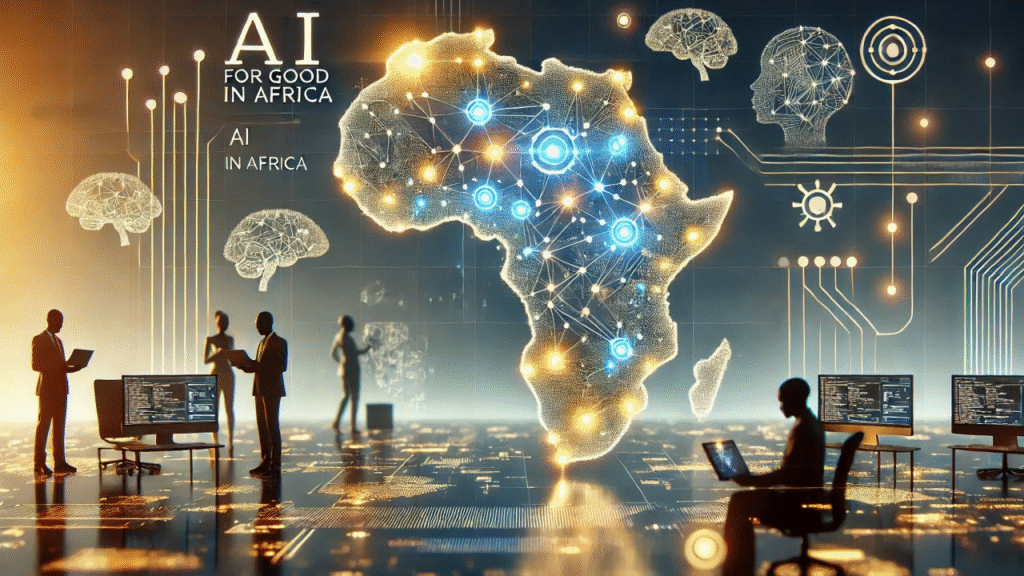
Summary Table: 10 Ways AI Is Changing Africa in 2025
| # | Sector | AI Impact Summary |
|---|---|---|
| 1 | Agriculture | Precision weather forecasting, yield boosts |
| 2 | Healthcare | Diagnostic tools, language‑aware chatbots |
| 3 | Local AI centres, youth training, startup growth | AI credit scoring, fraud detection |
| 4 | Education & Culture | Language preservation, personalized learning |
| 5 | Environment | Flood alerts, anti‑deforestation, land restoration |
| 6 | Governance | Language preservation, personalised learning |
| 7 | Innovation | Data centres, certifications, connectivity |
| 8 | Infrastructure | AI‑driven policy, public service optimisation |
| 9 | Enterprise | AI tools for SMEs, voice assistants |
| 10 | Governance & Ethics | AI policy, Safe‑AI frameworks, data sovereignty |
Why this matters
Artificial Intelligence is threading through African societies in seven distinct ways—from farms and clinics, to classrooms and boardrooms. For the first time in history, the technology is being applied on the continent at scale and tailored to its unique languages, cultures, economies and geographies.
If this momentum continues—with smart investments, ethical regulation and deep commitment to inclusivity—Artificial Intelligence will prove its power not just as a technological marvel, but as a catalyst for transformation that Africans design, lead and own.
Join Our Social Media Channels:
WhatsApp: NaijaEyes
Facebook: NaijaEyes
Twitter: NaijaEyes
Instagram: NaijaEyes
TikTok: NaijaEyes


